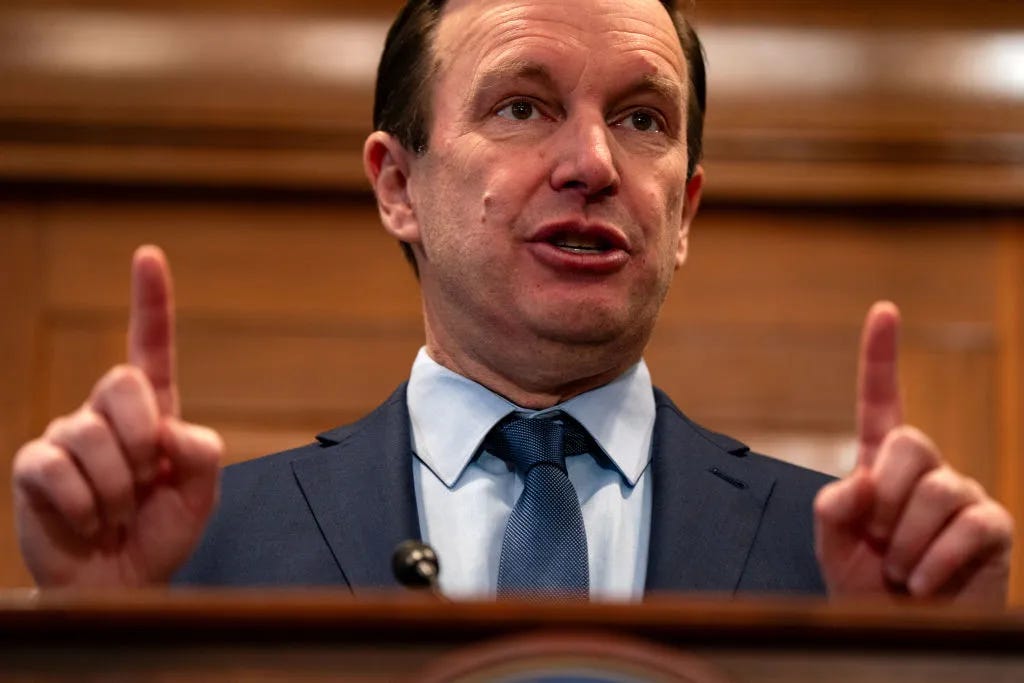Yesterday we talked to Senator Chris Murphy, Democrat of Connecticut, one of the fiercest voices speaking out against the Trump administration and in defense of the future of the American republic. He spoke very bluntly about just how real a threat this administration poses for the survival of American democracy, about why the Democratic Party has failed so far to meet the moment and what can be done to fix it — and why it’s ultimately up to the American people to mobilize to stop Trump and Musk from breaking the country’s institutions beyond repair.
As we know some of you prefer reading to watching, we’re publishing text excerpts of the conversation below, and we encourage you to watch the full video above. It’s a frightening warning and a real call to action.
In the public interest, we are opening this video and transcript to all. But please consider subscribing to support fearless, independent reporting, and build the kind of independent media that can continue to speak truth to power in this moment.
Senator, you're a student of American history, and you've studied the various stages in the history of this country: wars, crises, insurrections, fractures — serious things. I wonder how you would define this moment we are living through and situate it in the sweep of the very serious things this country has been through in its history?
I'm very reluctant to engage in too much hyperbole here, but I think this is increasingly becoming the most serious moment since the Civil War.
It's a miracle that we've lasted as long as we have, 240 years of multicultural democracy. This is an absolutely revolutionary idea that gets pulled apart, as it seems, every generation or so, because it's unnatural, the idea that we would make decisions for ourselves instead of investing decision-making power in a hierarchical structure, which is what we do for mostly everything else that we care about in our lives, and that we would choose to live amongst people who are very, very different from us, even while our biology, millions of years baked, tells us that we're better off and safer retreating to our tribes.
So what we've done is unnatural. Self-governance in a society that's multi-religious, multi-ethnic, multi-racial. And so, of course, there are these times where folks get told it would just be a lot more efficient if one guy made all the decisions, get stuff done a lot faster. And wouldn't it be easier if we just kicked out everybody who doesn't look and feel and sound like us? That'd be a lot simpler.
So I think that this is increasingly serious because I think what you're seeing is that a lot of people are very transparently up for that transition. There are a lot of people in this country — and a lot of folks who now occupy positions of power in the United States Congress — who don't even feel that it's necessary to defend democratic norms and democracy.
This idea that took root inside the conservative movement maybe a decade ago that democracy is outdated and antiquated and needs to be replaced by a CEO model is now pretty mainstream. And I think we need to confront it head-on.
Instead of thinking that Republicans are really for democracy in their heart, but are being cowed into silence by a really strong leader, we need to understand that a lot of them — more than you think — are actually on board for this whole transition.
That comparison you make, I think is valid — this is the most serious crisis since the Civil War. Obviously, we know how that one was resolved. I don't think that way of resolving this would be what anyone wants, certainly not what you or I want.
But I'm curious, maybe speak personally first. I think we've all witnessed you — not to say you were a wallflower before — go through something publicly in the last few weeks.
You've been very clear about a lot of things for a lot of years. Can you talk about the experience you've gone through to get to that place of realizing the gravity, even in spite of how seriously you took it before? What has been your radicalization around this in the last few weeks and how have you changed?
I've spent a lot of the last two or three years just stepping back and doing a lot of thinking about the spiritual state of the country. And I think I came into this moment maybe understanding better than some other people how angry and anxious this country is and how many people are in a truly revolutionary mood.
And so for me, it made sense that there were a lot of folks in this country who were really willing to entertain the idea of throwing out 240 years of democracy. Now, that's not the majority of the country, but it's a strong, powerful minority movement.
I've been pretty angry at my party for not realizing the spiritual unspooling that was happening in America and finding ways to plug into it in a more powerful, more constructive manner, even as the anti-democratic conservative movement very methodically put together a plan and an infrastructure to make sure that they were able to seize this moment.
I think a lot of folks thought that Trump 2 was going to be Trump 1 again, just a lot of bluster. We'd survive. But I watched them get ready for this moment. And so I'm just convinced that they are operationalizing, as we speak, a plan to convert our democracy to something fundamentally different, an oligarchy, a kleptocracy in which only a handful of people have power and the rest of us are just pawns for profit and gain to that small set of elites.
And so all of the moves that have been made, the targeting of independent journalists, the conversion of our justice system to an exercise in forcing loyalty to Donald Trump, the normalization and endorsement of political violence, are all not just random points on a map. They all exist on a continuum, part of an effort to ultimately try to install Donald Trump and his family in power permanently.
And I think this has been coming. The groundwork has been laid for this moment for four years. And I just am absolutely confident that it is as grave and as significant as the crises that we faced 150 years ago.
I think it is no surprise to you that Democrats out there feel completely abandoned by the vast majority of your colleagues. I think there's a sense of being texted a lot for $5 by Democrats, often by people who have hundreds of millions of dollars in their own bank accounts, when we're living through what you say is the most serious crisis since the Civil War.
And I'm sure you could point to things someone said in committee and things that are being done that we don't know about. But I think you probably sympathize with the broad feeling that I'm sure you've heard from your constituents and others, that basically people feel completely undefended by the Democratic Party in the worst crisis since the Civil War.
You're an exception to that, and I think most people would agree. Just put it as bluntly as you can: What is going wrong with your party that they are leaving so many of their most loyal supporters feeling this way?
One is that it's a lot easier to get up in the morning if you convince yourself that everything is going to be okay. It's a lot easier to go do your job if you think that all of these are just random points on a grid and that this is going to look a lot like the first four years looked.
If you actually think that we are months away from the destruction of democracy such that it is irreversible — man, that requires a different level of energy when you wake up every morning, a different level of urgency that, frankly, not everybody has inside the Democratic political infrastructure.
I think it's also true that when you get to this level of power, you start to care deeply about the institutions and you want to protect your institution. And so here in the Senate, there's still a lot of talk about working with Republicans and not fighting Donald Trump on everything because we want to make sure that the Senate is preserved as a place where bipartisanship can happen.
But that's illogical when you're fighting a would-be tyrant who doesn't give a shit about institutions or norms and is willing to shatter every single one.
If the rest of the field is burned to the ground and the Senate still stands on the top of a pedestal, what does it matter? So for me, it was easy to say, I'm not voting for any of Trump's nominees. I'm not expediting any of these nominees until this constitutional crisis is solved. I'm not going to be complicit in populating an administration with people who are going to violate the rule of law.
And then the last thing is that it's hard when you're fighting liars. It really is. We do hold ourselves to some concept of truth and provable truth. And I think it has caused us to not be clear about what is likely happening because we're not absolutely sure. What is Musk doing inside the Treasury right now? Do we have irrefutable proof that he is stealing people's data in order to enrich himself or in order to ultimately withhold your Social Security benefits because you post something ugly about him on Twitter?
I don't have a smoking gun, but why should I give them the benefit of the doubt? Why do they deserve the benefit of the doubt on anything? I am going to lay out the worst-case possible scenario because I think the worst-case scenario is the most likely one.
Does what you just said justify leadership changes in the House and the Senate immediately?
I think the Senate and the House are stepping up here. I think you have seen my colleagues come to the decision almost to a person that they are not going to support these nominees.
I think you will see a very vigorous effort to oppose the upcoming reconciliation bill, which is their attempt to steal money from the rest of us, to cut Medicare and Medicaid benefits to fund their tax cuts. I think you are going to see Democrats starting to rise to this moment, and I'm going to continue to try to rally them to rise to this moment.
But people are asking in the chat specifically about Senator Schumer and Leader Jeffries — and if you're right about, “months away,” if you're right about the worst crisis in 150-plus years, is it time to at least think about new leadership?
I think they both have very difficult jobs. I wish that all 47 Senate Democrats were really easy to marshal and push into one direction, but they aren't. We have a diverse cast of characters. And so leadership is pretty easy to critique from the outside. It's harder to operationalize on the inside.
And remember, leadership doesn't only come from the folks that have the official titles. Leadership comes from AOC. Leadership comes from Jasmine Crockett, leadership comes from me, from other senators.
I wanted to ask you about this broader point that people were making last year during the debate about whether President Biden should stay on the ticket. And that is the question of whether Democrats have a kind of culture of politeness that prevents them from stating hard truths. Things everybody was saying in group chats about President Biden's capacity were not being said out loud. Things everybody is saying privately about this moment don't necessarily reflect what they say in front of the cameras. Is there a politeness problem that needs to be shaken off given the stakes that you're talking about?
That's a good question. I've never really thought about it as a politeness problem. But listen, there certainly has been a shaming exercise that has happened inside this party on folks who get too far out of the conventional wisdom. In retrospect, Dean Phillips, though I didn't support his candidacy, understood something about where the American public was that it took the rest of us far too long to understand.
Bernie Sanders and Elizabeth Warren still get shamed by the mainstream of the Democratic Party because they are dangerously populist, even though they are plugged into the actual conversation that people are having in this country.
I want to ask you a little bit about the new party chair of the Democratic Party. There was a question of how fundamental the change should be. What is the process, do you think, at this point, of really rethinking the party in the way that you were trying to do in the last few years and now with much greater urgency? It's obviously difficult to do when you're also running 80 miles an hour. How can this happen right now?
I don't think we should overhype the power of the DNC. It has never been a thought leader inside the Democratic Party. I'm not saying it isn't relevant. I weighed in on behalf of another candidate, because I do think it's important to have the right person there. But I think Ken Martin will do just fine. He will be a very good party chair.
But yes, it does feel overwhelming. There was this, and there still exists, this meme, this idea that the resistance didn't work in 2017. And so we shouldn't do it again. And in part, because people want to focus on a bigger project, which is rebuilding the Democratic Party brand and winning back all those working-class voters. And I've talked a lot about that as well.
I think the problem is we actually have to do the resistance and rebuild the party, and we have to do both at the same time. And I actually don't think there's a choice.
The resistance, to my mind, worked. We didn't stop the big tax cut in 2017, but we stopped the repeal of the Affordable Care Act. We literally saved tens of thousands of lives. We won in the midterms in 2018. We beat him in 2020. Did it solve the underlying problems in the party? No, but there were political wins and really big ones. There were policy wins and some really big ones. So I think you've got to do that again, so that you shave the edges off of their policy agenda and ultimately you put yourself in the best position to win in 2026.
But we have to rebuild the party because the party brand is just fundamentally broken. We are the party of elites. We are the party of the status quo right now. We are the party of market-based reforms. And people want real big revolutionary economic change. They want the system unrigged. They want a democracy unrigged. And right now we are not the party selling that convincing message.
So I admit that these are two big projects that have to happen simultaneously. rebuild some form of the traditional political day-to-day resistance and convince folks that we cannot run back the Democratic Party that got our clocks cleaned in 2024. We've got to build a new party.
One idea that's been proposed is creating a single point of communication — people have suggested Pete Buttigieg, who's out of government right now, have him do a daily response, or there are various “shadow cabinet” proposals. I'm sure you’ve heard a lot of these. Do you think any of those things are interesting as a way to solve the party’s communication problem, the problem of people not really having a clear response?
Not really. I'm all for people searching for new ideas. That just sounds like something else for people to compete over. If you were to create a shadow cabinet and you had to pick Democrats to be in each one of those positions, you'd have to come up with a process and there'd be campaigns and backroom efforts to try to be the Shadow Secretary of Defense.
It would be a lot of wasted energy and I'm not sure, ultimately, it would result in the best people being in those positions. I mean, what's happening now is a little meritocratic. The folks who have more amplified voices are the folks who are just more plugged in with the actual emotional zeitgeist of the country.
And I don't necessarily have a problem with a moment in which the folks that are portraying the kind of urgency that the American public wants are the folks that are being self-selected by the movement in the country as leaders inside the party.
Now, do I think that we have an information distribution problem? Yes. But I think that that is something that needs to be solved in a really thoughtful, planful way.
We don't have the echo chamber that Republicans have because they spent money on it and we didn't. We spent a billion dollars — $2 billion in the last election — and most of that was on 30-second TV ads. That was a horrible mistake. We should be building the kind of permanent owned media, the permanent set of influencers and amplifiers that the right has.
That should be our project, not coming up with a bullshit shadow cabinet.
So you’ve talked about blanket holds. Senator Schatz of Hawaii has talked about this also. Are there other tactics in your arsenal, maybe ones we haven't been talking about, maybe more serious ones? If you say we're possibly a few months away from irreversibly losing democracy — what else have you got besides blanket holds?
There are a limited number of tools in our toolbox as the minority party in the Senate and the House. The House has very few. The Senate has a handful. One of them is just kind of gumming up the works and making things take a little bit longer. But that tactically only prevents nominations or legislation from occurring by hours.
The other is to just signal that we are not being complicit in any of this, and we are not going to support them doing anything legislatively, or we're not going to support any nominations until they take seriously the destruction of our democracy and the handover of our government to billionaires.
So I don't want to overhype what we can do internally, while also telling my colleagues, you better do everything you can do.
And that's still an internal debate. There still are a lot of my colleagues who are voting for these nominees. They've got a lot of reasons they do that, but one of them is that they don't think that our internal day-to-day tactics translate to the outside, that nobody pays attention to what happens inside the Beltway.
I don't think that's true. I'm not saying everybody pays attention to whether there's 47 of us or 21 of us voting against the nominee to go to the Department of Agriculture. But I do think that the most committed activists don't love it when the Democratic Party isn't putting up the loudest fight that they can. And if we aren't putting up a loud fight, then they aren't willing to give four hours a day or six hours or eight hours or 12 hours a day to the fight. And when that inner ring of the most committed activists aren't doing that, the next ring of potentially committed activists aren't stepping in.
So I think there are ripples that start here in the United States Senate. And so that's why I argue to use every tool that we have, because I actually do think over time, that's one of the tactics that helps build a meaningful, loud, national opposition with scope.
I’ve pressed you and your party on what you can do for people. But obviously, this is a democracy. And at the end of the day, people need to make their own voices heard and pressure people to do things. But I think a lot of people are at a loss. What can people do besides the obvious stuff that they know to do?
I think the obvious stuff that people know to do still works. There were protests yesterday, some with hundreds of people, some with thousands, but not necessarily of the size and scope that you would think this moment would demand.
And I think that is due to the fact that a lot of folks don't think that it has impact and influence — and it does. The only route through this crisis is the mobilization of the public. Political gravity still exists in this country. It works a little bit differently than it did 10 years ago or 20 years ago. But if the public is mobilized, it will and can have an impact. Right now, joining groups like Indivisible and Move On, calling, showing up — all of that matters. Volume matters.
It may not persuade Elon Musk to stand down, but it will start to eat away at enough Republicans so that everything they want to do becomes a little bit harder, so that there is finally a little bit of legislative friction against the tasks that they are undertaking.
Donald Trump's net popularity has come down by six or seven points already. If that drops by another six or seven points because of our mobilization, well, then that frays a bit the hold that he has on the party.
I remember back in 2017 when their number one agenda item was to repeal the Affordable Care Act, and they didn't do it only because we mobilized, only because in the end, we made just enough Republicans realize that this was not going to be worthwhile for them politically. That works now.
Now, ultimately, if they completely break this thing — and I think that comes by the transparent, brazen violation of a court order, and most significantly, an order from the Supreme Court — then we have to talk about a wholly different set of tactics. And I don't think we need to cross that bridge right now. But if we are at a moment in which they have just completely and brazenly taken control of the government without any regard to the judicial branch, then we have a different conversation about the kind of things that citizens should be doing.
But right now, traditional political mobilization can and I think will work. But we need more people than hundreds out at these protests. And part of that is our job, to have more people talking like me to convey the sense of urgency that will convince people to mobilize.
People have suggested a general strike. Is that something you think people should look at?
Listen, I think when we talk about those elevated tactics — general strikes, civil disobedience — I think people will know the moment when it comes. And you frankly don't want to promise that you can do something that you can't. So I think you've got to be very thoughtful and planful in those kinds of actions. I don't think we are there yet. If the moment comes, I think people will know it.
A lot of people appreciate your leadership right now. Are you thinking about running for president? And including or beyond that, what would be your commitment to people if this continues to go in the very bad trajectory that you talked about? What is your vow to people about how you're going to defend people who are feeling very defenseless?
You asked the question at the beginning, why are people paying attention to me now?
I think it's in part because I legitimately don't have a personal agenda here. Like, I do not wake up every day thinking about my political future. I've got two kids who I want to grow up in a democracy, and I see how dangerous this moment is. I have clarity. I have existed in politics for a long time, plagued by a lot of gray. There's a lot of moments in my political career in which I saw my side, but I also saw their side.
And now, I see what they are doing, and what they are doing is evil.
So I wake up every day speaking authentically and urgently in part because I'm not thinking about my next move here. I will be satisfied if, at the end of the day, democracy is still here four years from now and we actually have a free and fair election for president.
You can imagine the kind of calls that we get into this office, given that political violence has been normalized and given the fact that I'm out there, talking in a way that not everybody else is talking. And so my only commitment is to just not be afraid in the way that a lot of other institutional players are clearly acting scared. I'm just not going to do it.
Readers like you make The Ink possible and keep it independent. Sign up to join our mailing list, support my work, and help build a free, fearless media future by becoming a paying subscriber today. And if you’re already a part of our community, thank you, and consider giving the gift of The Ink!













